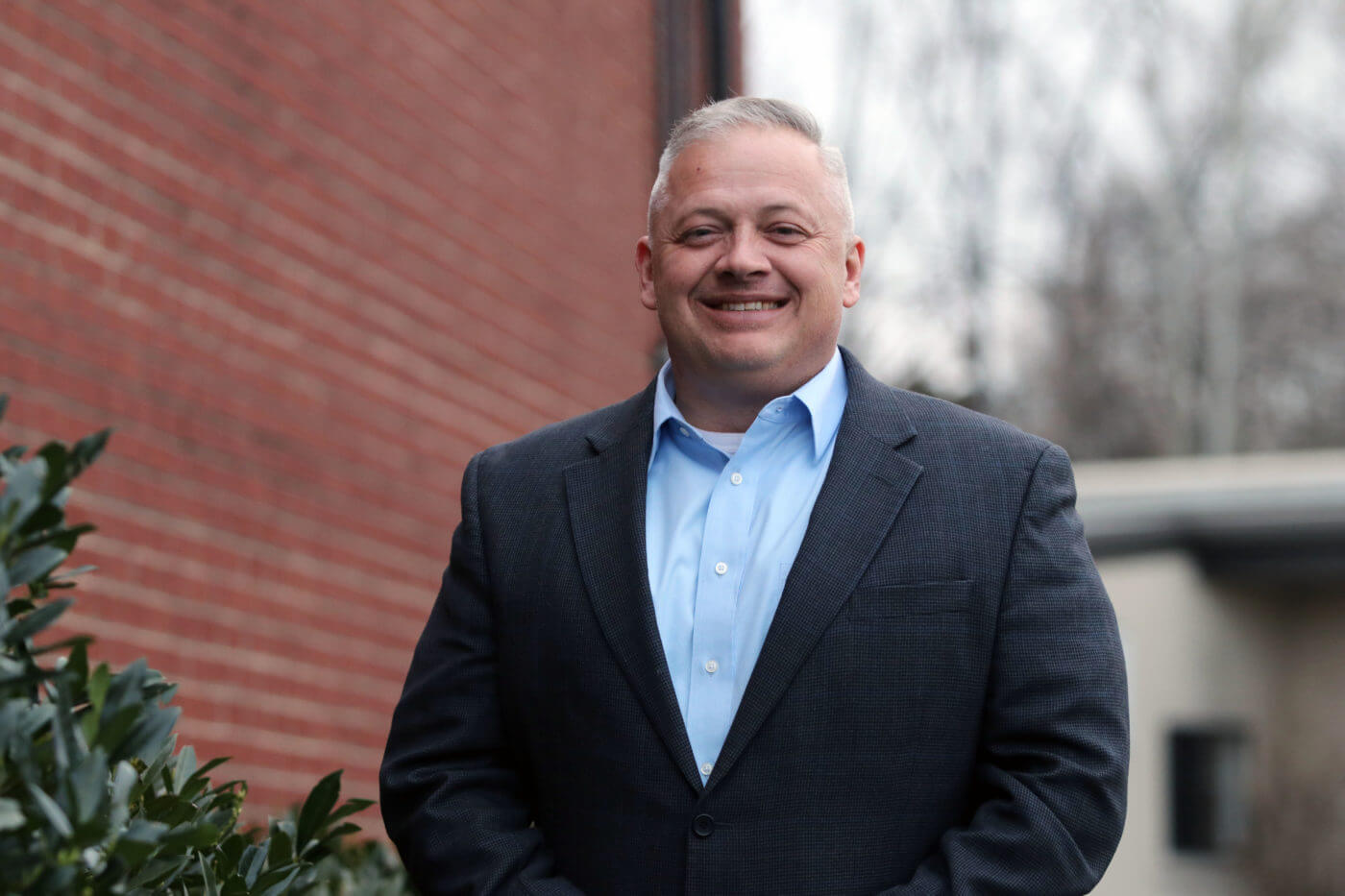
“And I’ll have to say this: This was the worst job I ever had, but it was one of the best things I’ve ever done.”
On October 27th, Merion West editor Erich Prince was joined by Rep. Denver Riggleman, who represents Virginia’s 5th Congressional District as a Republican. Rep. Riggleman, a freshman member of Congress who has gained attention for his focus on issues affecting rural voters, was narrowly defeated in a drive-thru party convention in June of this year by Bob Good. (Rep. Riggleman previously joined Merion West for discussions in January of 2019 and October of 2019.) In this candid conversation, Mr. Prince and Rep. Riggleman discuss the Congressman’s upcoming departure from office, his reflections on the state of the Republican Party (in Virginia and across the United States), his recent book release, and his plans for the future.
Congressman, good afternoon. How are you?
Hey, how are you today?
Good. Nice to hear from you again—I know it’s been a little while since we were discussing the rural broadband, so it’s nice to connect again.
Oh my gosh, it sure is, buddy. It sure is.
So, just to get started—a lot has taken place since we last spoke.
It sure has. It sure has.
So where is your head at? How are you feeling?
Incredibly happy—I mean, incredibly blessed. I’m actually talking to you from my 50 acres at my distillery right now. We’ve been able to get some legislation through here in the last few months through committees that I never thought would happen, and the very things I promised I would do are happening. So, a little bit bittersweet. Right as I’m leaving Congress, I’m getting bills passed I didn’t think people think could happen based on the fact that it’s so tribal in there now. But the flip side of that is—business is great, my family is happier. And I’ll have to say this: This was the worst job I ever had, but it was one of the best things I’ve ever done.
I think I saw an interview when you first started, and you said [something to the effect of], “Jeez, I didn’t know my schedule would be so packed—that it would be this much work all the time, running from pillar to post.”
It really was, and I think part of that, too, is I also had a family running a company. So, I was a true non-politician, businessman, military individual who got into politics for service, and trying to do all that simultaneously was a challenge. However, I was able to do it fairly easily because I had such an incredible staff.
But I’m also very good at multitasking. So that was fantastic. I think the thing that I forgot about—honestly, Erich—is I forgot that I had to kiss the ring of certain people all the time, and that’s something I wasn’t willing to do. And I think that independent streak is what got me here, but I also think it’s the independent streak that had me go down in that convention—in that church parking lot—which was one of the most awful, bizarre, and corrupt things I’ve seen. So, yeah, it’s been a historic time for me, for sure—I’ll tell you that.
Maybe the plus side is that there is a little more freedom now to speak out. I saw your interview with Chuck Todd the other day; you were talking about the two-party system. I’ve done a number of interviews with Republican politicians—Tom Davis, for example—who either had to leave in a primary situation or said, “You know what? I’m out of here.” Do you now have a certain kind of freedom to speak your mind about the inner workings of Congress?
Erich, you know that got me in trouble to begin with, before I even ever had a convention. I talked about the inner workings of Congress and the frustration, and the fact is I wasn’t willing to toe the line on things I didn’t agree with. The fact is I’m much more libertarian-minded than certain peoples in the Republican committees of the 5th District, but I was perfect for the entire district. It just seemed to me that we were going down this ideological path that I didn’t approve of, and now you’re seeing what’s happening. We have a Republican candidate that could possibly get beat in a district I would have won handedly. But here’s the flip side to it: The best thing that ever happened to me was the fact that I did not have to campaign during this cycle. It really has allowed me to be a voice that people will listen to. They know that I’m here because of voting to protect preexisting conditions when it wasn’t popular—but now everybody wants to do it. I was voting for preexisting conditions before it was cool in the Republican Party. I think the other thing, too, is the same-sex wedding I officiated. Now, we want to try to bring everybody in. But when I did that, I was called some awful things, like I’m told, the antichrist.
[The same-sex wedding], I guess, was what gave rise to this whole primary challenge.
Well, it was one of the two reasons. One reason was the same-sex wedding. The second one is that I refuse to pay to play because the committee members expect the congressmen to pay them off so there’s not a challenge. They’re very corrupt and awful human beings. So, I think those two things—my refusal to pay to play or kiss the ring in a historically corrupt convention system that Virginia has been running and me being more of a social libertarian—I think that really threw people off, and they saw me as a threat to them making money in the district and the grift that they have. But they also saw me as somebody who was bringing a new way of thinking, and I think that terror forced them to do some things untoward to get me out of there. And you know what? Fantastic. If that’s what they want to do, you get what you get, and, as a free-thinking American with my First Amendment right, I’m going to go out there, and I’m just going to pummel those bad ideas as much as I see fit.
For example, when Tom Coburn first left Congress, he wrote this tell-all book, so to speak, about exposing the inner workings of Congress. Any thoughts about doing something like that?
Well, I mean, I was going to write something called The Accidental Congressman, but you know I’ve got a book release soon, Erich?
Yes.
And that’s Bigfoot… It’s Complicated. That’s the inner workings of belief systems and conspiracy theories, and, also, it is the exact book that people were accusing me of being Bigfoot erotica, which I told you is ridiculous.
I remember—I think you spoke with Connor [Mustakas] at the time, in January [of 2019] when you were just getting started, and there were—the Internet was awash with all this stuff about that.
I was number one on Twitter. When I talk about disinformation like QAnon, when I talk about my background as an intelligence officer in information operations, I watched it happen to me, just on Twitter—by a tweet that was absolutely unvalidated and completely false. It was just a lie. And I watched a mother give the tweet to her daughter, who is an actress in Hollywood with millions of followers, and actually perpetuate the lie through specific disinformation because they wanted to win so bad. So, that’s why I know what happens. This book is the book, and I actually thank my Democratic Party opponent from 2018 for actually introducing the term “Bigfoot erotica” to America because I didn’t even know—
I wasn’t familiar with it, either, Congressman. It was new to me. [Laughs]
So, I actually thanked her in the book for doing that.
You’re really immersing yourself back into that citizen-politician life. It’s crystal clear.
I’ll tell you what, man—I have never had more fun. When you go on Meet the Press, or Jake Tapper, or Ana Cabrera—I just got an interview with People magazine. It’s amazing, Erich. You guys have been there from the beginning.
I think we were some of the first people. We spoke to each other when you were first getting started.
That’s right. You’ve seen what’s happened. I would say this book—when I release Bigfoot… It’s Complicated, I think people are going to laugh, I think they’re going to cry, and I think they’re going to be terrified.
We’re going to have to get our hands on a copy and do a review or something.
It is not a book that is self-aggrandizing; it’s not me mythologizing like a lot of these political books where people are trying to run for office again, which I find laughable. I’m not branding myself, so it’s just me saying, “This is a book I’ve been working on for 14 years.” It has to do with conspiracy theories. It actually talked about belief systems that can go sideways in a funny way, but also a terrifying way. And now here I am, going against QAnon, so I don’t know if I’m lucky or fortuitous.
But the reason I feel so lucky is that I’m now able to release this book because I really betrayed myself by not releasing it as soon as I was told it was “Bigfoot erotica.” When they said it was that, out of ridiculousness, I should have released it then. But my team was like, “Listen, you’ve got a long history. Don’t release the book because somebody forces your hand.” I’m like, “Ah, I’d really like to do it.” They said, “Please don’t,” so I didn’t—against my feelings on it. And now I’m very happy to get it out there, so people can actually see what it is and the stupidity of that attack—how vile it was—can be highlighted through this book.
I’m looking forward to reading that. In the time we have left, I wanted to ask you about a topic that has been something you’ve talked with us about from the beginning—making sure rural issues are well-represented in Congress. We’ve talked about rural broadband; I know you’ve recently been working on this Protect Rural Housing Act. How, going forward, can Congress make sure—I know your district is part rural areas, you’ve got Charlottesville, you’ve got all sorts of areas, so how can Congress make sure that rural issues are front and center?
Don’t be afraid to vote for the legislation in your district, regardless of your party bosses. I’ll give you an example: In H.J.Res.31, the first one I voted for to open the government, that was one of the bills that Republicans used against me. They seemed really happy when they got the tens of millions of dollars in rural broadband funding that came from it.
So, not being afraid—and also by being on the Financial Services Committee—I was able to do some of these directed things. For instance, people don’t know this, but I’m so proud of it. The community bank leverage ratio from 9% to 8% that was actually passed in the law to fight COVID, in the CARES Act to allow community banks to lower their ratios so they could lend more money—that was me. Nobody’s going to really know that because they don’t care about that. They just cared about screaming and crying and lying about me as much as they could, and not having a primary. I think you have to do what is right regardless of the circumstances sometimes. That’s why I’m also so pleased. I might be the most successful one-term congressman in Virginia’s history! [Laughs]
But it must be frustrating for you—that you’re working so hard on some of these issues and then you have a primary where they want to focus on personality stuff, a wedding, and all of this.
Oh, please use “drive-thru convention.” I wish it was a primary, by the way. I really do. But they focused on a same-sex wedding and me voting for preexisting conditions. And the Republican candidate, Bob Good, just put out an ad saying he supported keeping preexisting conditions when he had an ad against me saying that I was evil to want to protect preexisting conditions because of Obamacare. The duplicity, the lack of truth, the grifting—the party system and convention system is broken in Virginia, and that’s why I’ve told a lot of people, “I don’t know if I’m ready to be a party guy anymore.” I think I’m more of an independent-minded individual, who thinks I can actually win as just Denver.
I know at the end of the Chuck Todd interview, he wanted to say, “Are you still a Republican?”
Like I said, I thought I was a Constitutional Republican, where the government stays out of your business, out of your pockets, and out of your bedroom. And I’ve always said, we don’t want a party just small enough to fit into your bedroom and—
That’s a good line. [Laughs]
Right? That’s what the Republican Party is becoming. They’re not even worried about policy. They don’t really have any policy chops at all. We were the party of Teddy Roosevelt, the party of Abraham Lincoln, the party of Ronald Reagan. We’ve got to have some kind of policy bedrock that we lay the party on and not just flippantly looking at social issues all the time. I think the new third-wave of the party—this new thing we’re going to see arise—are people that are more socially liberal or libertarian and also know that the government can’t spend its way to prosperity. I think that is the balance that I have right now, and it might not fit anywhere. That just doesn’t fit anywhere.
To that point, there have been some successful Republican politicians in New England, like Charlie Baker and the like, who say, “We’re socially liberal or libertarian and concerned about fiscal issues,” but maybe that’s not as true in Virginia.
In Virginia, the Republican Party is really the third party now. I think we have 30% of the voters in Virginia identifying as independent. I want to say, in the next five years, if the Republican Party continues this way, it is going to be the third party. You’re going to have Democrats, Independents, and then Republicans because they are getting to the point where [Republicans] are as marginalized in California. Unless you have a real policy change, you’re not going to win Virginia because it is blue. Anybody who says it’s purple, they’re full of it. And the thing is—what you have to do ,though, is look at issues and move forward on issues. Right now, I think there’s a lot of people who vote blue that are barely center-left. They are almost dead in the middle, but they hear the Republican Party has gone crazy on social issues. I think that’s part of it.
So maybe a possible candidacy down the line as an independent?
I almost want to use what is on George Washington when you look at his Wikipedia or biography, where it talks about “unaffiliated.” I want to run as me, based on the policies that I’ve learned—not only in my short time in Congress but as an entrepreneur, CEO, and military intelligence officer. I’ve had an incredible life. I guess what I’m trying to tell you, Erich—I’m as happy as I’ve ever been because of the way I went out. I went out with such integrity, and it’s an incredible feeling. There is nothing they can do to me. I don’t need the paycheck. I’m not in the political pipeline. I’m not part of the “staffing.” This was never something that I had as a career, so I’m able to be a true citizen legislator. By the way, I hate legislating. I think I’m a better executive—and I was really good at legislating. I was really good at it, but I didn’t enjoy it. I really enjoyed being an executive; I’m used to being a CEO. I’m sort of used to being in charge, and I think that’s where I want to go. That’s just where I’m more comfortable.
So you’re feeling pretty good about things? I know a lot of politicians whom I talk to who lose elections—it’s a pretty painful thing, but it sounds like you’re definitely looking on the bright side of it.
Somebody asked me the night of, “What happens tomorrow morning if you lose this thing?” Whatever that was—that drive-thru, Dairy Queen convention. I said, “The sun comes up, just like it would if I win or lose. It doesn’t matter. I’m going to be drinking a bourbon on my porch, win or lose, tomorrow because I don’t need this. I did it because I wanted to, and that is a huge difference. People are like, “Are you upset?” I’m like, “I don’t like being cheated.” I don’t like people who run from a fair fight because they’re afraid of me. That’s such a cowardly way to do things. But that cowardly way is what’s getting the Republican Party of Virginia in such trouble. Most of them are cowards, and they want power over actually serving the people. I’m going to say that, and if they don’t like it, I honestly don’t give a damn. That’s where I’m at right now.
In many respects, you’re able to speak your mind, you have your own business—that makes you, maybe, a dangerous man to party leaders.
It makes me incredibly immune to stupidity, but it doesn’t make me immune to getting beat. If you think about that—if politics is always a race to the bottom, we have to change something here. I think the two-party system and how tribal it has become and how money-dominated—I think it’s actually hurting people. Look at what is happening with the CARES Act right now or the PPP [Paycheck Protection Program] extension. You can’t get anything done because they’re wondering what their polling is going to look like on Election Day, while people suffer. I think that’s the stuff that makes me—if anything makes me angry, it’s really that.
Is there any solution to that? I know term limits are probably pretty unlikely to pass. How do you encourage more citizen politicians, so to speak, who want to go back to their businesses eventually? Is there any solution you see to this on the federal level?
People who are very successful in life outside of politics were very encouraged when I won and very discouraged when I lost. They think, “Well, if you lose, and you were ten times the candidate of your convention opponent, what happens to people like us who have been successful in life?” They’re afraid to get into politics because watching these people and the way they act is a disgrace. The thing is, I’ve still got to be involved in some way because I told people from the beginning, “If you hate politics, you’ve got to be a part of it.” I just had somebody ask me the same thing. They said, “Denver, you do hate this. Nobody thinks that you’re kidding. Would you do it again?” I said, “It’s a conundrum for me,” because, right now, if I never went back in politics, I’d be just fine. It wouldn’t bother me at all. I don’t miss what they call “the juice.” A lot of politicians told me I’d miss “the juice. I already had the juice, man! I’m independent. I had more juice than all of them combined because they’re actually locked into these left-right parameters they can never break out of. They’re servants to the party. They’re servants to other people who determine whether they get elected or not. I don’t have to do that. I can go out there and say, “This is what I think. You can vote for me, or not.” And I know that everybody is going to poo-poo me, probably trying to run as unaffiliated or as an independent, or whatever. But if I were to ever run as a party again, I would do it completely on my own terms and the party structure be damned. I’m going to run as Denver Riggleman. If they don’t like it, again, that’s not my problem.
Last question—is there anything you’re going to miss about Washington? I know you’ve been involved in some important legislation. Is there anything when you’re back at the distillery, and you’re going to say, “Man, I wish I could be part of X, Y, or Z”?
I’m going to miss walking into the chamber with incredible people like Guy Reschenthaler from Pennsylvania, William Timmons from South Carolina. I’m going to miss people on both sides of the isle—Dean Phillips, Tom Malinowski, some Democrats—Abigail Spanberger, Elaine Luria, Rob Wittman, Ben Klein, all the Virginia delegation that meets once a month. I’m going to miss them all—Republicans and Democrats. I don’t know if people know this; let me give you some context. The Virginia delegation, I think, is still the only delegation that meets once a month in a bipartisan way, which is the Virginia way. That, I’ll miss. That feeling of service, I’ll miss. But anything else? Not a damn thing. I think the one thing I’ll really miss is my server, Cliff, at The Capital Grille, who actually would always make sure my bone-in fillet was cooked perfectly. So here’s to you, Cliff, I’m going to miss you, buddy. I’m still going to go to D.C. and have a great time. I’m still going to see Cliff and have bourbon and have my bone-in fillet, but that’s probably what I’m going to really miss—my relationships with people at the restaurants who knew me, some of the people who would always come see me. I miss that. But Cliff at The Capital Grille—I’ll miss that guy, and I’ll miss that bone-in fillet every week.
That’s a great place to end, Congressman. I appreciate it.
I appreciate you, man. Thank you so much.
Always a pleasure, and I’ve enjoyed covering you the past two years, so thanks so much, Congressman.
Anytime, my friend. Take care.










